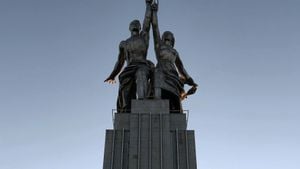Artificial Intelligence has recently strolled its way onto the global stage with such force, sparking heated discussions mainly revolving around the recent Nobel Prize awards. The intersection of technology and traditional fields, like Physics and Chemistry, has left many academics and enthusiasts wondering: how much of these monumental achievements are truly human endeavors, and what’s the role of AI?
The Nobel Prize ceremonies, synonymous with unparalleled honor, became the backdrop for growing discourse about technology's influence on scientific creation. This year's winners, renowned for their significant breakthroughs, have provoked questions surrounding the mechanisms underlying their discoveries. Major figures, among them Geoffrey Hinton, once dubbed the “Godfather of AI,” emphasized the dilemma where the lines appear blurred between human intellect and artificial intelligence.
Hinton's extensive contributions to AI, particularly neural networks, have dramatically reshaped machine learning. Despite his departure from Google, his research is central to today's advancements. His insights, especially the importance of AI, are at the forefront of discussions on the scientific contributions of technologies like AI. "We need to recognize the role AI plays; it’s becoming integral to scientific achievements across disciplines," Hinton stated recently during his address.
But it’s not just Hinton speaking up. Across universities and research institutes, scientists are grappling with the rising tide of queries about the extent to which AI should be credited. The conversation prominently features its applications—ranging from simulating quantum states for Physics to developing new materials in Chemistry. Researchers like Frances Arnold, who won the Nobel Prize for her evolution-based work, shared thoughts on how AI is redefining their fields. "Artificial intelligence can optimize processes and theories we previously perceived as fixed or traditional. The possibilities appear endless," Arnold explained, hinting at the transformative capability of AI.
Debates surrounding AI extend beyond academic discussions; they have increasingly crept toward ethical dimensions. The ethical discussions inherently orbit around authorship, reward allocation, and dependency on AI systems. Are we risking over-reliance on machines? Some scholars suggest this might distance innovative thinking and independent problem-solving from human researchers. David Mackay, a reflective researcher on the matter, posed the question: “Will genuine scientific curiosity suffer as we lean heavily on AI?”
Certain experts maintain perspectives portraying AI as more of a collaborator rather than the star. They insist it’s fundamentally human intuition and creativity that's acting as the catalyst for scientific breakthroughs. Advocates of this ideology argue for the need to blend machine efficiency with human insight to cultivate student curiosity and engagement, grounding students with foundational principles instead of merely leveraging machine capabilities.
AI's entrance (or should we say takeover?) of the Nobel stage has prompted many to reassess its impact on scientific culture. During the announcement of winners, debates emerged about awarding prizes to AI-led projects. If the AI systems are doing the calculating, where do we place human characters within the award narratives? The engaging platform for exchanging ideas on science's changing nature can be seen widely across social media, webinars, and conferences aimed at demystifying these tangled relationships.
The key to sustaining this scientific dialogue hinges on collaboration between traditional fields and technology industries. Conversations stemming from this year's Nobel Prize discussions encouraged not just raw recognition for AI but also harmonious collaborations. Renowned physicist Antonio E. L. D. Ferreira mentioned the challenges with academia's adaptation to these tech advances: "Universities and tech companies need to maintain the balance, thriving together rather than pushing against one another."
Many educators, scientists, and technologists remain forefront to kindle these discussions, reaffirming the need for moderated, inclusive dialogues. Events around the world are seeing panels addressing the proper integration of AI and human contribution, stressing the need for coherent guidelines.
The Nobel Prize is undeniably at the heart of traditional scientific recognition; as AI gains traction, we must acknowledge its merits as energy to new scientific heights. Our society is ripe for discussions about redefining the fundamental values of recognition within scientific fields. Will we continue to perceive Nobel achievements primarily as human, or will we allow technology to share the dais? Expectations form around the excitement of not just future awards but the implication of their processes brought almost to the forefront by revolutionary AI.
At this crossroads, the potential transition toward recognizing achievements born from AI could very well inspire future generations, ensuring they not only learn but actively engage with the world of AI symbiotically. Rapid advancements show little prospect of slowing down, making it imperative for institutions to adopt adaptive curricula, emphasizing AI's role not only as workhorse but as explorer of boundless realms.
Consequently, scholars like Hinton and Arnold herald the beginning of what may very well be thought of as the AI Renaissance period, with the Nobel debates standing as emblematic of willingness to rethink existing frameworks. With open dialogues flourish between scientists and AI, envision the wonders they can enable; the work of today can inspire ideas of tomorrow.



